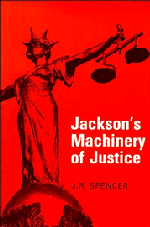Book contents
- Frontmatter
- Contents
- Acknowledgements
- List of figures
- List of tables
- Preface
- Preface to the first edition of ‘The Machinery of Justice in England’
- Abbreviations
- I Historical introduction
- II Civil jurisdiction
- III Tribunals
- 13 The creation of tribunals
- 14 The Franks Committee
- 15 Tribunals today
- 16 The distinction between ministers' decisions, tribunals and law courts
- 17 Control by the law courts
- 18 The Parliamentary Commissioner for Administration
- IV Criminal jurisdiction
- V The personnel of the law
- VI The European dimension
- VII The cost of the law
- VIII Law Reform
- Appendix A The Report of the Civil Justice Review
- Table of Cases cited
- Table of Statutes cited
- Table of Stationery Office publications cited
- Index
15 - Tribunals today
Published online by Cambridge University Press: 10 January 2011
- Frontmatter
- Contents
- Acknowledgements
- List of figures
- List of tables
- Preface
- Preface to the first edition of ‘The Machinery of Justice in England’
- Abbreviations
- I Historical introduction
- II Civil jurisdiction
- III Tribunals
- 13 The creation of tribunals
- 14 The Franks Committee
- 15 Tribunals today
- 16 The distinction between ministers' decisions, tribunals and law courts
- 17 Control by the law courts
- 18 The Parliamentary Commissioner for Administration
- IV Criminal jurisdiction
- V The personnel of the law
- VI The European dimension
- VII The cost of the law
- VIII Law Reform
- Appendix A The Report of the Civil Justice Review
- Table of Cases cited
- Table of Statutes cited
- Table of Stationery Office publications cited
- Index
Summary
The previous chapter has already given some idea of the number, range and scope of special tribunals. Many of them, like the Immigration Appeal Tribunal and the tribunals in the social security system, exist to decide disputed matters between the individual and the State. But there are other important tribunals which handle disputes between citizen and citizen: Rent Tribunals, Rent Assessment Committees and Industrial Tribunals are obvious examples. The number of special tribunals has grown and goes on growing. The number of tribunals under the supervision of the Council on Tribunals now stands at well in excess of 50. The number of cases heard by tribunals has also increased. The days when tribunals could be described as a kind of appendix or addendum to the ordinary law courts have gone. A high proportion of adjudications dealing with the affairs of ordinary people, namely social security, housing and jobs are made by tribunals, not by the ordinary courts. Table 5 shows the number of cases which were heard in the county courts before judges and registrars and in some of the more important tribunals in 1985. This shows that the tribunals handled nearly three times as many as the county courts.
- Type
- Chapter
- Information
- Jackson's Machinery of Justice , pp. 118 - 143Publisher: Cambridge University PressPrint publication year: 1989

